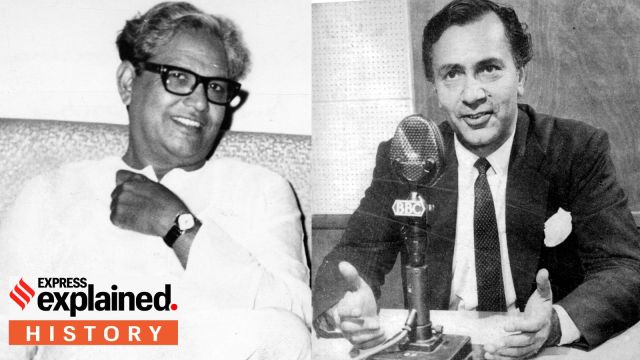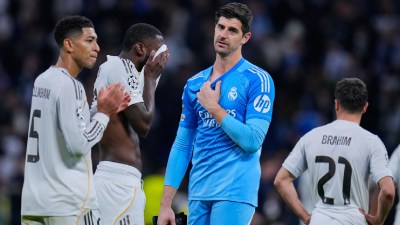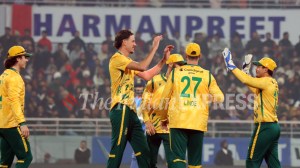During a speech in the Rajya Sabha on Monday (December 16), Union Finance Minister Nirmala Sitharaman accused the Congress party of having a history of “curtailing freedom of speech”. She invoked an incident involving Indian film artists around the time of Independence.
The minister said, “Majrooh Sultanpuri and Balraj Sahni were both jailed in 1949 itself for what mistakes, sir? During one of the meetings organised for the mill workers in 1949, Majrooh Sultanpuri recited a poem that was written against Jawaharlal Nehru and, therefore, he had to go to the jail.”

“He (Sultanpuri) refused to render an apology for the same and was jailed,” she said, adding, “You know, today we (referring to Opposition members) hold our Constitution in our hand go about it and say freedom of speech, there is a sense of fear in the country. Majrooh Sultanpuri didn’t feel it? Balraj Sahni didn’t feel it?”
Who were Majrooh Sultanpuri and Balraj Sahni?
Born Asrar Hasan Khan, Sultanpuri is regarded as among the most prominent poets and lyricists of his time. He penned the lyrics for iconic Bollywood songs like ‘Ek Ladki Bheegi Bhaagi Si’, ‘Yeh Hai Bombay Meri Jaan’, ‘Chura Liya Hai Tumne Jo Dil Ko’, ‘O Haseena Zulfowali’ and ‘Papa Kehte Hain Badaa Naam Karega’.
He also won India’s highest film honour, the Dadasaheb Phalke award. Describing his work, the National Documentation Centre on Mass Communication (a part of the Ministry of Information and Broadcasting) once wrote: “Majrooh Sultanpuri was the last member of a formidable quartet – Sahir Ludhianvi, Shakeel Badayuni and Shailendra being the other three – which while not ignoring the compulsions of commercial cinema transformed film songs into sheer poetry. They were the ones who introduced the ghazal to film music.”
Sultanpuri wrote against British rule in India and joined the Progressive Writers’ Movement, an organisation whose members supported socialist and communist ideologies. Many other prominent artists in the Hindi film industry were openly involved in such political activism then. Often, the messaging of their films reflected their political views.
Stage and film actor Balraj Sahni was also a member of the PWM. He starred in films such as Do Bigha Zameen (1953) and Kabuliwala (1961). His last film Garm Hava (1973) was considered a milestone in parallel cinema, winning a National Film Award and getting nominated for the Palme d’Or at the Cannes Film Festival.
Story continues below this ad
The National Film Development Corporation of India has called him a “champion of neo-realistic cinema”, who “brought a sense of authenticity and social awareness to his roles.” Sahni deeply supported Marxism. He was also part of the Indian People’s Theatre Association (IPTA), supported by the Communist Party of India. However, he later criticised the party for turning the group into its mouthpiece and “breaking the backbone of the IPTA.”
Why were Sultanpuri and Sahni arrested?
In the book Majrooh Sultanpuri: The Poet for All Reasons (2021), author Manek Premchand detailed the incident. At a workers’ agitation in Mumbai in 1949, Sultanpuri recited a poem, which had a portion criticising Nehru’s decision to include India in the list of the Commonwealth of Nations.
“Aman ka jhanda is dharti pe, kisney kaha lahrane na paye, Ye bhi koi Hitler ka hai chela, maar le sathi, jane na paye! Commonwealth ka daas hai Nehru, maar le sathi, jane na paye! (Such unease with our flag of peace! He is some protégé of Hitler, A mere slave of the Commonwealth is Nehru, Friends, take him by the collar lest he gets away)”, Premchand wrote.
The state government issued an arrest warrant against Sultanpuri. He went underground and was arrested only in 1951, lodged in the Arthur Road Jail for a year. “After his arrest, Morarji Desai, the then Home Minister of Bombay, had asked him to apologize so he could be forgiven. The poet had refused to do so”, the book says.
Story continues below this ad
Premchand wrote that Nehru was among the earliest supporters of the Progressive Writers’ Movement. Nevertheless, Sultanpuri opposed a “specific political issue about dominion status under the Commonwealth of Nations”. He felt that it gave India “equal status” but “with an allegiance to the Crown”.
He wrote, “Many people, Majrooh included, thought this was a sell-out. After all, what was the meaning of Independence if there was still a foreigner calling the shots here?” While Nehru also initially opposed joining the Commonwealth, he and the Congress party later agreed to it. With India becoming a Republic in 1950, this dominion status ended.
“In an interesting reversal of what Nehru’s Congress had done to this man, it was during the same Congress party’s rule that the highest film related recognition of India, the Dadasaheb Phalke Award was given to Majrooh for the year 1993. The Prime Minister at the time was PV Narasimha Rao, an Urdu enthusiast, and the man who conferred the shawl on the poet was the President of India, Shankar Dayal Sharma who was an Urdu scholar,” Premchand noted.
On Balraj Sahni, he wrote that the order for his imprisonment alleged he had a role in “inciting violence during a Communist Party procession.” Sahni was imprisoned for six months and later wrote that following his release from jail he was “disowned” by the IPTA and the Communist Party. “My life had become a rudderless ship. As if this was not enough, I was having to put up with threats from the police. They were even trying to make me their informer,” he wrote.
Story continues below this ad
That did not result in the end of Sahni’s interest in socialist politics. Much later in 1972, during a speech at the Jawaharlal Nehru University in Delhi, he mentioned Nehru. “Today it is obvious to everyone that in the last twenty-five years the rich have been growing ‘richer’ and the poor have been growing poorer. Pandit Nehru wanted to change this state of affairs, but he couldn’t. I don’t blame him, because he had to face very heavy odds all along. Today our Prime Minister, Indira Gandhi, pledges herself to take the country towards the goal of socialism. How far she will be successful, I can’t say. Politics is not my line. For our present purposes it is enough if you agree with me that in today’s India the propertied classes dominate the government as well as society.”








































